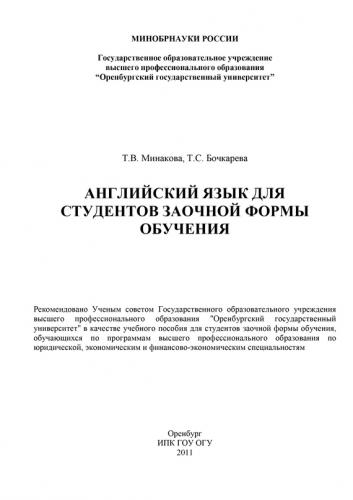to regard – рассматривать;
to commit – совершать;
guilt – вина;
intoxication – опьянение;
to release – освобождать;
exceptional – исключительный;
to enumerate – перечислять.
judicial – судебный;
people's assessors – народные заседатели;
to be in session – заседать;
majority – большинство;
to determine – определять;
equal standing – равная правоспособность;
to exclude – исключать;
to appeal – обращаться;
to supervise – осуществлять надзор, наблюдать;
to exercise supervisory – осуществлять надзор;
observance – соблюдение;
application – применение;
to see to – присматривать;
according to – в соответствии с. … as a rule – как правило;
premeditated – предумышленный;
intent – намерение;
to put into effect – приводить в действие;
to plot – замышлять;
to depend on – зависеть от;
to contain – содержать;
to abandon – отказываться;
corpus delicti – состав преступления.
2.1.4.4 Задание 2. Прочитайте тексты А, В, С, D, E, F переведите их письменно
Text A. The Procurator’s Office
The Procurator's Office is a state organ that ensures the correct application end observance of the state's laws by all ministries, organisations persons in office and all the citizens. It also protects the personal rights of citizens. It investigates criminal cases, collects evidence against criminals and sees to it that other investigating organs act according to the law.
The procurator has the right to appeal against any unlawful decisions and actions of state organs and persona in office. The procurator maintains prosecution before the court in the name of the state.
Text B. The Courts in our Country
The court is an organ of state that administers justice on the basis of the laws of the state.
There are courts of first instance and second instance. A court of first instance examines a case in substance and brings in a sentence or a judgement. A court of second instance examines appeals and protests against sentences and judgements of courts of first instance.
The basic judicial organ is the district court. It tries both criminal and civil cases. The district court consists of a judge and two assessors. Cases are tried in public and proceedings are oral. The participants in the trial (the victim, the accused, the plaitiff, the defendant and others) speak in open court. The accused has the right to defence.
The higher courts are city courts, regional courts and others. These courts hear and determine more important cases. They also sit as courts of appeals.
The highest judicial organ is the country's Supreme Court supervising the activities of all the judicial organs of the state.
As a court of first instance it tries the most important criminal and civil cases. It also hears appeals against sentences and judgements of lower courts.
Text C. The System of Law in our Country
Law is a system of rules established by the state.
The main aim of law is to consolidate and safeguard the social and state system and its economic foundation. The system of law in our country consists of different branches of law.
Constitutional law is а leading branch of the whole system of law. It's principal source is the country's Constitution. It deals with social structure, the state system, organization of state power and the legal status of citizens.
Administrative law is closely connected with constitutional law but it deals with the legal forms of concrete executive and administrative activity of a government and ministries.
Financia1 law regulates the budget, taxation, state credits and other spheres of financial activity.
Civil law is connected with relations in the economic sphere of social life, with relations involving property, its distribution and exchange. The right in property is the central institution of civil law.
The rules of labour law include the legislation on the labour of industrial and office workers and regulate matters arising from labour relations.
Criminal law defines the general principles of criminal responsibility, individual types of crimes and punishment applied to criminals.
Criminal law takes the form of a criminal code consisting of a general and special part.
Text D. Criminal Law
Criminal Law is to provide for the Russian social and state system, personal property and the personal rights of citizens against criminal encroachments.
Criminal Law defines the acts which are socially dangerous and mustbe regarded as crimes. It lays down the penalties that should be applied to persons committing these crimes. Here are some leading principles of Russia Criminal Law:
1 A person may be charged with criminal responsibility only when he has committed an act specially provided for in Criminal Law.
2 Responsibility can exist only in the presence of guilt.
3 Criminal punishment shall be applied only by sentence of the court.
4 Persons committing crimes in a state of intoxication are not released from criminal responsibility.
5 The death sentence may be passed as an exceptional penalty in cases specifically enumerated in law.
Text E. The Russian Court and the Procurator’s Office
The Russian Court is an organ of state that administers justice on the basis of the laws of the Russian State.
The basic Russian judicial organ is the district People's Court which consists of a judge and two people's assessors having the rights of a judge when the court is in session.
The district People's Court hears the majority of the cases. More important cases such as the crimes against the state are determined by the regional court or a court of equal standing.
The Supreme Court of Russia is the highest judicial organ of the Russia State. It is charged to supervise the work of all judicial organs.
The Procurator's Office is established to exercise supervisory power over the strict observance and application of the law by all organizations, officials as well as by all citizens of the country.
Other duties of the Procurator's Office are to investigate criminal cases, collect evidence against the criminals and
